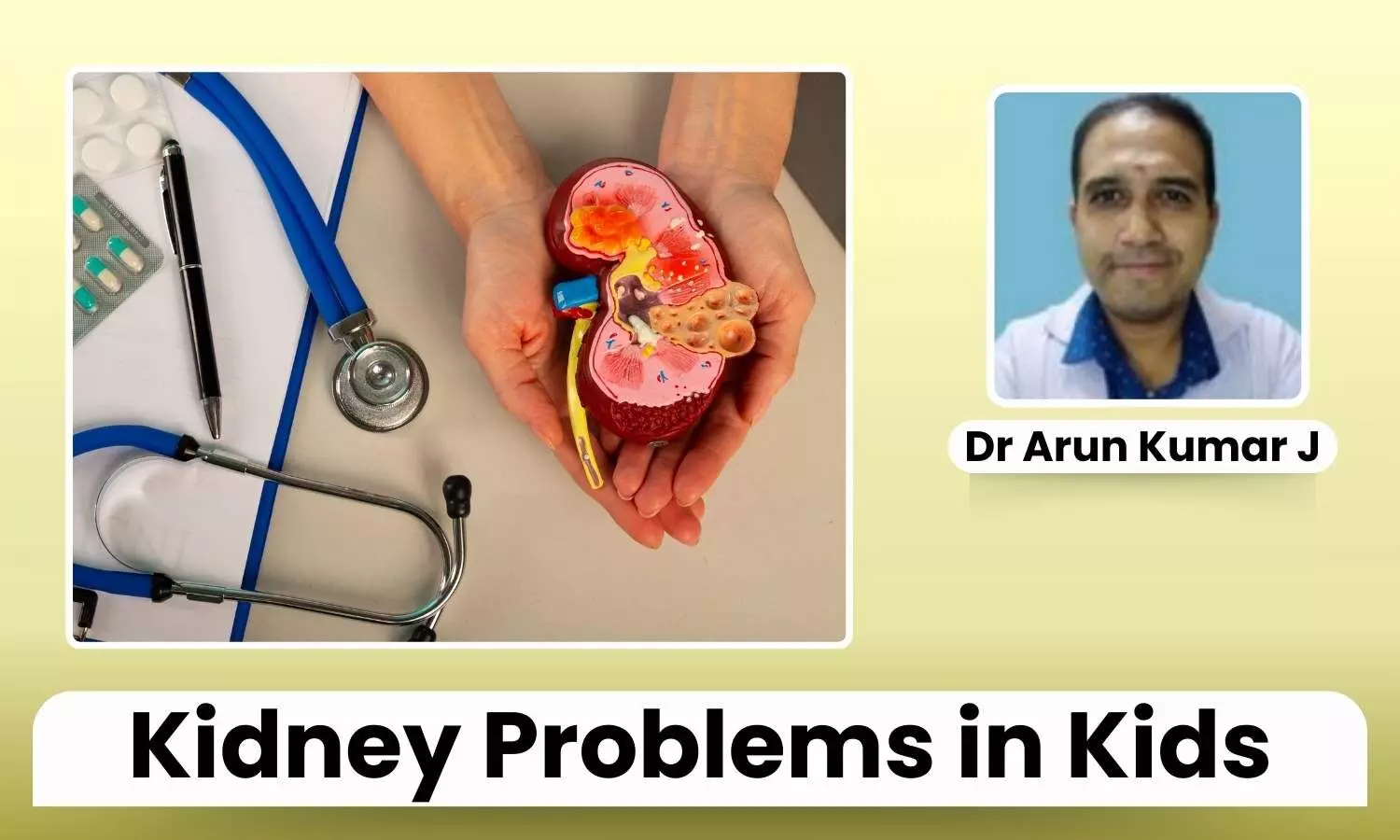Spotting Kidney Problems in Kids: Signs Every Parent Should Know - Dr Arun Kumar J

Kidney problems are often associated with adults, but children can also develop kidney-related conditions that require immediate attention. The kidneys play a crucial role in filtering waste, balancing electrolytes, and regulating blood pressure.
Early detection of kidney problems in children can significantly improve outcomes, yet many parents are unaware of the signs and symptoms to watch for. This article aims to educate parents on recognizing these issues and understanding the importance of early diagnosis and treatment.
Common Signs of Kidney Problems in Children
Kidney problems in children can manifest in subtle ways. Parents must pay close attention to any unusual symptoms that may indicate an underlying kidney condition. Here are the most common signs to watch for:
1. Frequent Urination or Changes in Urinary Patterns
• Children with kidney problems may experience increased frequency of urination (polyuria) or reduced output (oliguria).
• Bed wetting beyond the normal age or sudden changes in urinary habits can be a red flag.
• Passing foamy urine is another important indicator of protein leakage in the urine.
• Crying while passing urine may suggest discomfort due to infection or other urinary tract issues.
• Urine that appears cloudy, foamy, or has an unusual colour (yellowish, red, or dark brown) may indicate the presence of blood, protein, or infection.
2. Swelling (Oedema)
• Swelling around the eyes, face, hands, or feet is a common sign of kidney dysfunction. This occurs when the kidneys fail to regulate fluid balance, causing fluid retention.
• Puffiness around the eyes, especially noticeable in the morning, may be an early sign.
3. Poor Growth and Development
• Healthy kidneys help in maintaining proper electrolyte and hormone levels, which are essential for a child’s growth.
• Children with kidney problems may experience stunted growth, poor weight gain, and delayed milestones.
• Persistent fatigue, weakness, and lethargy are often associated with chronic kidney conditions.
4. High Blood Pressure
• Although uncommon in children, high blood pressure can be a symptom of kidney disease.
• Regular monitoring of blood pressure in children, particularly those with a family history of kidney disease, is essential.
5. Abdominal or Back Pain
• Persistent pain in the abdomen, lower back, or sides may signal kidney stones, infections, or other kidney-related issues.
• Children may complain of discomfort while urinating, which can indicate a urinary tract infection (UTI) that, if untreated, can affect kidney health.
6. Recurrent Urinary Tract Infections (UTIs)
• UTIs are a common childhood condition but can be a warning sign of an underlying kidney issue.
• Symptoms include burning pain during urination, fever, foul-smelling urine, and lower abdominal pain.
• Frequent or untreated UTIs may lead to kidney scarring and long-term damage.
• A history of urinary abnormalities in other children within the family may indicate a genetic or structural predisposition to kidney issues.
7. Nausea, Vomiting, and Loss of Appetite
• Children with kidney problems may experience persistent nausea, vomiting, or a lack of appetite due to the build-up of toxins in the body.
• These symptoms, coupled with weight loss or poor nutrition, warrant immediate medical attention.
Causes of Kidney Problems in Children
Kidney problems in children can result from a variety of conditions, including:
• Congenital Abnormalities: Structural abnormalities present at birth, such as kidney dysplasia or reflux, can impair kidney function.
• Infections: Recurrent or severe UTIs can damage the kidneys over time.
• Genetic Conditions: Disorders like polycystic kidney disease (PKD) or Alport syndrome may run in families and affect kidney function.
• Glomerulonephritis: This condition involves inflammation of the kidney’s filtering units and often follows infections or autoimmune issues.
• Kidney Stones: Though less common, kidney stones can occur in children and cause severe pain and urinary issues.
• Nephrotic Syndrome: A condition where the kidneys leak large amounts of protein into the urine, leading to swelling and other complications.
Importance of Early Diagnosis and Intervention
Early diagnosis of kidney problems in children is critical to prevent long-term complications such as chronic kidney disease (CKD) or kidney failure. Pediatricians may recommend the following diagnostic tests:
• Urinalysis: To detect blood, protein, or signs of infection in the urine.
• Blood Tests: To evaluate kidney function by measuring creatinine and blood urea nitrogen (BUN).
• Imaging Tests: Ultrasound, CT scans, DMSA scans, or micturating cystourethrogram (MCU) to assess kidney structure, detect abnormalities, and identify reflux conditions.
• Blood Pressure Monitoring: Regular checks for hypertension, a key indicator of kidney disease.
How Can Parents Protect Their Child's Kidney Health?
Preventing and managing kidney problems requires awareness and proactive steps:
• Encourage Hydration: Ensure children drink sufficient water daily to promote kidney function and flush out toxins.
• Monitor Urinary Habits: Pay attention to changes in frequency, colour, or odour of urine.
• Balanced Diet: Provide a healthy diet rich in fruits, vegetables, and whole grains while limiting excess salt and processed foods.
• Address Infections Promptly: Seek medical attention for signs of UTIs or infections to prevent complications.
• Regular Check-Ups: Routine health check-ups, especially for children with a family history of kidney disease, can aid early detection.
Conclusion
Recognizing kidney problems in children requires vigilance and awareness from parents and caregivers. Symptoms such as frequent urination, foamy urine, swelling, poor growth, and fatigue should never be overlooked.
Early diagnosis and timely intervention can significantly improve outcomes, allowing children to lead healthy and active lives. If parents notice any concerning signs, consulting a paediatrician or paediatric nephrologist is the first step towards protecting their child’s kidney health.


